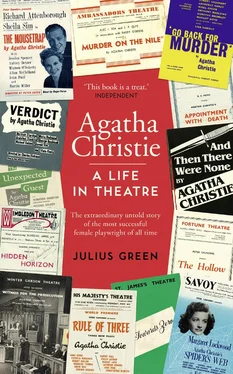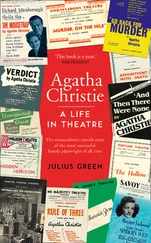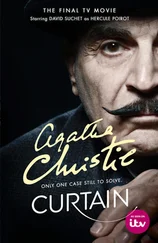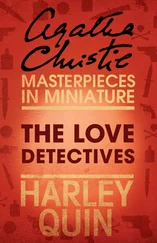From the point where she finally broke through as a playwright in the 1950s, it is clear that Christie continued to regard writing books as her day job, but that she found true creative fulfilment in her work for the stage. In her autobiography she notes:
Of course I knew that writing books was my steady, solid profession. I could go on inventing plots and writing my books until I went gaga … writing plays seemed to me entrancing simply because it wasn’t my job, because I hadn’t got the feeling that I had to think of a play – I only had to write the play that I was already thinking of. Plays are much easier to write than books, because you can see them in your mind’s eye, you are not hampered by all the description that clogs you so terribly in a book and stops you getting on with what’s happening. The circumscribed limits of the stage simplify things for you. You don’t have to follow the heroine up and down the stairs, or out to the tennis lawn and back, thinking thoughts that have to be described. You only have what can be seen and heard and done to deal with. Looking and listening and feeling is what you have to deal with. 1
In a 1951 article on Christie, The Stage newspaper reported that she found writing plays easier than writing books because ‘With a play you can go straight to your plot and characters and you have not to deal with the problem of describing scenes and the movements and habits of people. If you are at all successful, all this appears automatically through your characters and the action in which they are involved.’ 2And, in an interview for the BBC Radio Light Programme in 1955, she once again stated that ‘Of course writing plays is much more fun than writing books … you must write pretty fast, keep in the mood and keep the talk flowing naturally.’ 3
Some commentators have interpreted such remarks as implying that, whilst writing books was Agatha Christie’s profession, writing plays was simply her hobby. My own view is that, for a writer who had a real aptitude for dialogue and who, by her own admission, felt hampered by ‘description’, playwriting was her true vocation. And her determined, twenty-year struggle to gain recognition as a dramatist bears witness to this. Like most playwrights, Agatha Christie has her good and her bad days but, speaking as a theatre practitioner rather than an academic, it seems to me that she is both a master of her craft and a unique and witty voice with a great deal to say about the human condition. Actors always seem to enjoy engaging with her characters and find much in them to relate to, belying the popular misconception that they are thinly drawn caricatures. Her work is laced, whether consciously or not, with echoes of the other great playwrights of the era, and some of the most celebrated actors of the day appeared in her plays.
So why has history been so unkind to Agatha Christie, playwright? At the height of her popularity in the 1950s the dominant producing force in the West End was Binkie Beaumont, but Christie’s most enduring working relationship was with Peter Saunders, a rival impresario who was openly critical of the monopolistic tendencies of the Beaumont empire. So, despite her popular success, Christie was notable for working outside the established (and at times fearsomely ruthless) West End oligarchy of the day; a fact that makes her achievements all the more remarkable. As a doyenne of the ‘well-made play’ she remained delightfully untouched by the Royal Court revolution and consequently does not even feature in the vocabulary of those academics for whom the history of twentieth-century British playwriting started with Look Back In Anger in 1956. She thus occupies a unique position as a playwright, outside both the prevailing theatrical culture and its counter-culture; and her theatrical vocabulary suits the historians of neither.
Another very straightforward reason for the neglect of Christie as a playwright is continued confusion over the authorship of the plays credited to her. As well as her own work for the stage there have been a number of second-rate adaptations of her novels by third parties; and this, combined with the enduring success of third-party film and television adaptations, has led to an assumption that the plays credited to her were not from her own pen. There is an immediate and obvious qualitative difference between Christie’s own work for the stage and that of her adaptors, but the staging of a number of such works in her own lifetime, and several more since, has inevitably diluted her own stock as a playwright. Christie herself was unequivocal on the subject, repeatedly expressing her displeasure at her stage adaptors’ work: ‘Several books of mine were dramatised by other people and they all dissatisfied me intensely,’ she told the Sunday Times in 1961. 4Ironically, though, whilst arguably initially hindering her own development as a playwright, the adaptors’ efforts provided her with an entrée to the world of theatre and its practitioners, where she became a willing student and gained the confidence to promote her own work: ‘I think what started me off was my annoyance over people adapting my books for the stage in a way I disliked.’ 5Certainly, she is the only playwright I can think of whose reputation has had to contend with the truly bizarre obstacle of a body of work for the stage penned by others but promoted to the public and the critics in her name.
And then there is the question of collaboration. Playwriting is often a shared undertaking, and writers from Shakespeare to Brecht to David Edgar have worked with others in the preparation of their scripts. There can be no doubt that one of the things that most attracted Christie to the stage was the collaborative nature of the process, enabling her as it did to exchange ideas with others in a way that her largely solitary work as a novelist did not. She was a willing and adept participant in script discussions, either as a commentator on other people’s adaptations of her novels or as a playwright herself attempting to address the concerns of producers, directors and actors. Despite the patronising claims of certain directors about the level of their own input, the fourteen full-length plays and three one-act plays that were premiered on stage in Christie’s lifetime, and which carry her name as sole playwright, are indisputably her own work. She only ever incorporated the suggestions of others up to a point, and always remained in control of the script development process. And when she was convinced that she was in the right she was legendarily immovable. Ironically, her own highly accomplished adaptation of one of her short stories was appropriated wholesale by an ‘adaptor’ without so much as an acknowledgement of her own dramatisation as source material. And, conversely, she had very little to do with the only script for which she is actually credited as co-adaptor. In such cases Christie herself acted in good faith at the behest of agents and producers, but it doesn’t help when it comes to establishing the extent of her own contribution to the dramatic canon that bears her name.
There is also perhaps a misconception that Christie exploited her reputation as a novelist to promote her career in the theatre, and that her theatrical successes were in some way dependent on the success of her books. If anything, as we shall see, the opposite was the case, and the expectations raised by the popularity of her detective fiction frequently hampered her progress as a playwright and prejudiced critical opinion against her work on the stage. Whilst her producers inevitably attempted to capitalise on her existing fan base, the adaptations of some of her best-selling novels proved to be critical and box office disasters, and theatregoers repeatedly demonstrated themselves to be more than capable of judging her work for the stage on its own merits. Christie’s success as a playwright was exceptionally hard-won and, far from resting on her laurels as a popular novelist, she consistently dedicated herself to honing her craft, observing and willingly learning from the numerous leading theatrical practitioners with whom she worked. In any case, Christie was writing at a time when combining careers as a novelist and a playwright was not uncommon; amongst the contemporary female playwrights who did so were Clemence Dane, Margaret Kennedy, Enid Bagnold, Dodie Smith and Daphne du Maurier. Christie was simply both a more successful novelist and, ultimately, a more successful playwright than any of them. And, for those who carp that her plays were simply adaptations of existing works, it is instructive to note how far these adaptations diverge from their source material and that, amongst her full-length plays, there are nine totally original works, six of which were premiered in her lifetime. Christie herself said, ‘I prefer to write a play as a play, that is rather than to adapt a book.’ 6
Читать дальше












